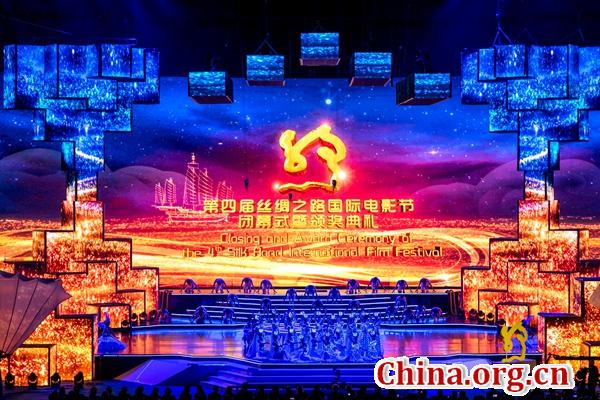4th Silk Road Int'l Film Festival draws curtains in Fuzhou
By Daniel Xu
Chinese megastar Jackie Chan, actress Yao Chen and singer Wang Leehom were among the celebrities who attended the closing and award ceremony of the 4th Silk Road International Film Festival on Sunday in Fuzhou, Fujian Province.

The festival is held annually, alternating between the cities of Fuzhou and Xi'an, Shaanxi Province. This year's event took place from Oct. 28 to Dec. 3, and hosted activities at different locations throughout Fuzhou, including film screenings, panel discussions and contract signing ceremonies.
Tong Gong, deputy director of China's State Administration of Press, Publication, Radio, Film and Television, said at the ceremony that "This year's Silk Road International Film Festival made important contributions to the cultural cooperation and exchange between countries along the Belt and Road," referring to China's massive international cooperation initiative launched four years ago.
The festival's concluding ceremony named three films the Golden Silk Road Feature Films of the Year: "Little Harbour" from Slovakia, "Bye Bye Germany" from Germany and "The Salesman" from Iran. French film "Louise by the Shore" was honored as the Animation Film of the Year, while state-owned China Central Television's "Belt and Road" received the award for Documentary Film of the Year.
For individual awards, Jackie Chan was named the Golden Silk Road Actor of the Year for his performance in "Kung Fu Yoga," and Kristin Scott Thomas received the Golden Silk Road Actress of the Year award for her role in "The Party."
Chan said in his acceptance speech that China's filmmakers have the responsibility to share Chinese culture with the world, and this film festival serves as a great platform for him and others in that regard.
In addition, the short film collection "Where Has the Time Gone?" by five directors from the BRICS countries— one each from Brazil, Russia, India, China and South Africa— received special honors from the festival's judges.
Representing the five directors to be honored at the ceremony, Chinese director Jia Zhangke said, "The movie is a brand new experience, giving audiences a whole new brand of film art."
The closing and award ceremony highlighted the weeklong festival's achievement in establishing cooperation and exchange between the film and entertainment industries of the countries along China's Belt and Road route. Out of over 1,000 submissions from 67 countries, the film festival selected 75 foreign and 27 Chinese movies to screen at theaters around the city.
Chinese director Huang Jianzhong headlined the committee of expert judges for the festival. He said he was pleased by the selection of candidates for the festival's top honors, most of which were small-budget films telling real-life stories.
"Some of the films touched me deeply," Huang remarked. He said that the stories are about average people but with themes that can relate to everyone, and that Chinese audiences should take a close look at these films.
The Silk Road International Film Festival is co-sponsored by China's State Administration of Press, Publication, Radio, Film and Television, the Fujian Provincial People's Government, and the Shaanxi Provincial People's Government.
Fuzhou was chosen as one of the host cities for its historical significance as the birthplace and gateway of the ancient Maritime Silk Road.
Huang said he has a very positive outlook on the festival's influence on China's film industry.
"This year the festival is four years old," he said. "We should have a long view on events such as this, and I'm confident that when the festival turns 20, China's film industry will be a major powerhouse in the world."